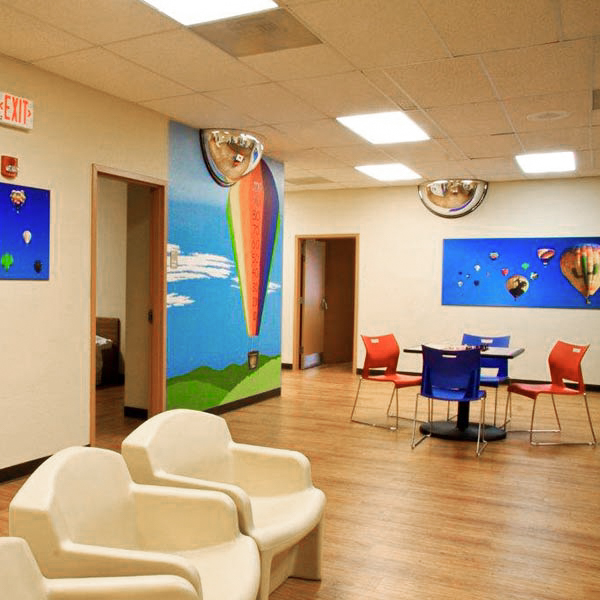Sonora Behavioral Health Hospital is dedicated to providing superior treatment to children, teens, and adults suffering from suicidal ideations. Located in Tucson, Sonora provides the comprehensive care needed to successfully manage mental health disorders and lead a life of recovery.
Treatment for Suicidal Ideations
Learn More About Treatment for Suicidal Ideations
Suicidal ideation is characterized by the presence of persistent thoughts of how one would end his or her own life. The content of these thoughts can be mild and fleeting in nature, or it can become increasingly more intense, evolving into detailed plans. The majority of individuals who experience chronic suicidal ideation do not intend to act on their thoughts, but the fact that the ideations exist are cause for concern, as no one can be sure when the line between thought and action will be crossed. While the presence of these thoughts are all-consuming, they do not have to continue to cloud your life. The staff at Sonora wants to help you develop the skills you need to overcome these devastating thought patterns and return to living the happy, healthy life you deserve to live.
Sonora Behavioral Health is a 140-bed leading acute inpatient psychiatric hospital in Tucson designed to provide optimal treatment for children, adolescents, and adults who are struggling with behavioral health concerns such as suicidal thoughts. We strive to stand out from our competitors by being the only inpatient treatment center in Tucson, Arizona that accepts children as young as five years old. The staff at Sonora recognizes the challenges that come with living a life tainted by suicidal ideation and we want to show you that there is hope for the future. We want to help you rediscover the strength you already have while developing the tools you need to manage your symptoms and move forward towards living the life you deserve to live.
Helping a Loved One
Helping a Loved One or Family Member Get Treatment
The majority of people who experience suicidal ideations are not likely to share their thoughts with those around them and are therefore not likely to ask for the help they need. They may be embarrassed about the thoughts they are experiencing, or they may simply not want to worry their loved ones. However, it is imperative that individuals who are experiencing suicidal ideation get the help they need at a treatment center in order to prevent them from crossing the line between thoughts and actions. Here are some warning signs that may indicate that a person is suffering from suicidal ideation:
- Isolating oneself from friends and family
- Participating in self-harming behaviors
- Participating in high-risk behaviors
- Verbalizing a sense of hopelessness about the future
- Verbalizing feelings of worthlessness, helplessness, or inexplicable guilt
- Making comments such as, “It’s not worth it anymore” or “There is just no point to living”
- Displaying a sudden sense of calm or emotional detachment
- Giving away personal belongings
If these are signs that you have noticed your loved one exhibiting, it is necessary that you step in and get him or her professional help. Initially, your loved one may deny having thoughts of suicide, but be persistent in order to ensure that he or she remains safe.
Why Choose Us
Why Consider Treatment at Sonora Behavioral Health
Struggling with chronic thoughts of suicide can have a detrimental impact on a person’s ability to function each day. Ideations about suicide can be all-consuming and become so overwhelming that those suffering from them find that they are unable to concentrate on anything else. These chronic thoughts can also beat down a person’s self-esteem, perpetuating a cycle of self-hatred which ultimately leads to increased suicidal ideation. When these individuals do not receive treatment to learn the skills to overcome their devastating thoughts, they can easily become so demoralized that their thoughts turn into actions, tragically resulting in death.
When suffering from suicidal ideation, taking part in an inpatient treatment program can be the best option for receiving the most thorough and comprehensive treatment that one needs. In addition to teaching people the tools needed to overcome their ideation, this type of treatment provides individuals with constant support 24/7 where, when the thoughts become overwhelming, there is always someone available to help talk them through it. Our inpatient treatment center also provides around-the-clock monitoring so that these people are safe from purposely harming themselves. By removing themselves from the stresses of everyday life, people are able to focus solely on becoming well again.
Philosophy & Benefits
Suicidal Ideations Treatment Philosophy and Benefits
As the leading psychiatric hospital in Tucson, we have made it our sole mission to provide superior behavioral healthcare services to the people, hospitals, and communities that we serve. By employing an evidenced-based treatment protocol that teaches effective coping skills, we are able to enhance our patients’ ability to remain successful after they are discharged from our care. Our highly trained and qualified staff is dedicated to providing comprehensive medical and psychiatric assessments, diagnostic services, and thorough treatment. By caring for patients who are struggling with acute illnesses in a sensitive and caring manner, the staff at our suicidal thoughts treatment center is able to assist those who come to us for help regain and maintain their highest level of functioning.
Types of Treatment
Types of Treatment Offered at Sonora Behavioral Health Hospital
Upon arrival at our psychiatric treatment center, each patient coming to us to heal from suicidal ideations will complete an initial assessment that will include a physical examination, a collection of medical history, a psychiatric evaluation, and a psychological assessment. During this time, we will also identify social skills, cultural and family issues, and determine any other needs that each patient may have. We use a multidisciplinary approach and our experienced clinical team is composed of psychiatrists, psychiatric nurses, internists, therapists, social workers, and expressive art therapists; all of whom are trained in treating individuals who are struggling with emotional health and substance abuse concerns. All treatment plans are individualized and include the following methods:
Medication management: Medication may be a crucial aspect of properly treating the symptoms of suicidal ideation. All patients are seen daily by a psychiatrist to ensure the effectiveness of any medications prescribed, as well as to make any changes that might be necessary. Additionally, all patients receive individual medication education in order to address any questions or concerns that may arise.
Group therapy: At our behavioral health treatment center, our main form of treatment is daily group therapy sessions. Rather than using process groups like many inpatient treatment centers do, we instead use solution-focused groups that teach patients a variety of skills needed to overcome their symptoms of suicidal ideation. Some of our group topics include sleep, hygiene, coping skills, stress management, self-awareness, relaxation, and self-help skills training.
Family meetings: Family members are encouraged to be actively involved in all aspects of the treatment process. Education about their loved one’s condition is provided and family members are in constant communication with case managers throughout their loved one’s stay.
Additional treatment methods may include the following:
- Daily meetings with a social worker
- Recreation therapy
- Expressive therapy, including art therapy
- Weekly dietary groups
Continuing Care
Continuing Care and Levels of Treatment
The discharge planning process begins as soon as a patient is admitted to our hospital. Within 48 hours of admission, a social worker will evaluate each patient for available resources that can be implemented once he or she has left our center, including placement, transportation, and aftercare treatment. When the time comes for the patient to be discharged, the social worker will coordinate placement with the patient, the patient’s family members, any outside community agencies in Tucson or elsewhere, or private insurance. If needed, social workers will also coordinate transportation from the hospital to the patient’s next placement on the day of discharge, as well as ensure that transportation needs for aftercare treatment appointments are met.
For adult patients that no longer require the intensive level of psychiatric care provided by inpatient treatment, Sonora Behavioral Health offers outpatient treatment that consist of nine to twelve hours of group therapy each week. These groups allow participants to process real-life scenarios as they happen, while also receiving the support they need as they practice the new techniques that they are learning. This eight to twelve week period of intensive treatment gives participants the chance to use a group setting to work through emotional and psychological issues that keep them locked in a state of distress. Through our outpatient programs, patients will learn techniques that they will continue to use for the rest of their lives.
Our partial hospitalization program (PHP) and our intensive outpatient program (IOP) allow patients to live at home and attend school or go back to work while still receiving the treatment that they need. PHP is held 5 days a week for 6 hours a day, while IOP is held 3 days a week for 3 hours a day. Both programs have a mental health and chemical dependency track. In addition to PHP and IOP, we have an aftercare program for alumni that is held once a month for as long as patients need.














